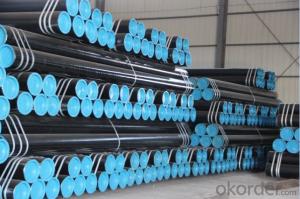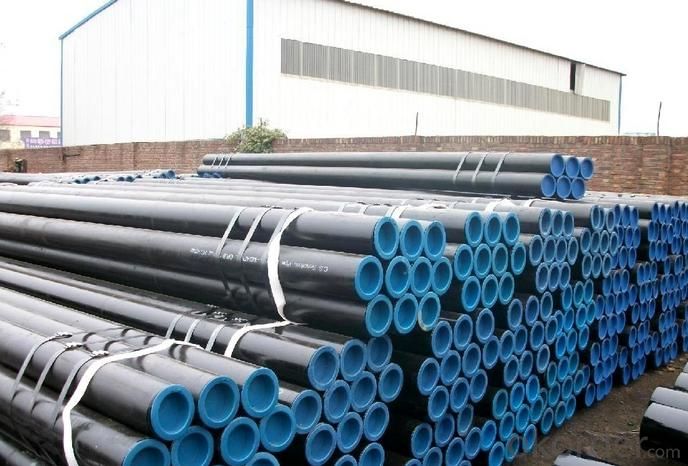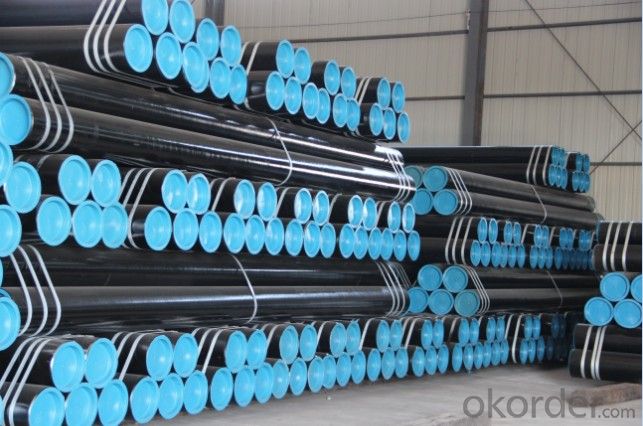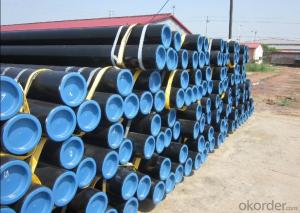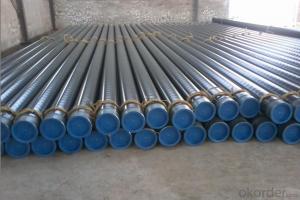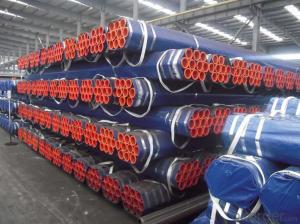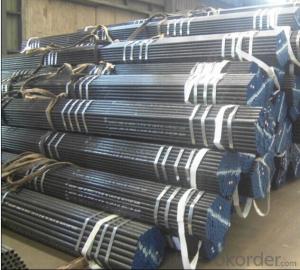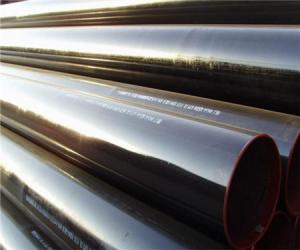Seamless steel pipe ASTM A106/API 5L/ASTM A53 GR.B high quality
- Loading Port:
- Tianjin
- Payment Terms:
- TT OR LC
- Min Order Qty:
- 10 m.t.
- Supply Capability:
- 5000 m.t./month
OKorder Service Pledge
OKorder Financial Service
You Might Also Like
1. Commodity Name: Seamless steel pipe
2. Standard: API,GB,ASTM,ASME,DIN
3. Quality grade: 10#, 20#, A106B, A53B, API 5L B, Q235, Q345, ST37-2, ST 45, ST52.etc.
4. Dimension:
OD: 1/2"-24"
WT: 2.5-80mm, SCH10~SCH40~XXL
length: 5.8m,6m,8m,9m,12m
5. Technique: Hot Rolled/Cold Rolled/ Cold Drawn
6. application
carbon seamless steel pipes are widely used in gas, water and oil, transpotation;constructions;Bridge,highway,windows of model steel door; building materials;fences;heating facilities Fluid Pipe;conduit pipe,scaffolding pipe.etc.
7. Payment Terms: L/C D/A D/P T/T
8.packing and shipment
Packaged in bundles,as per customers' requirements, it can also bepackagesd as beveled ends, typed marking, black painting, plastic caps protection,woven bags packing
For 20" container the max length is 5.8m; For 40" container the max length is 12m. other options are available based on customer requests. Please discuss when placing orders.
9. Surface: painted with varnish;
10. Plastic caps at ends.
11. Tolerance: OD +1%/-1%
WT +12.5%/-10%
12. Chemical composition:
Models of Steel Pipes | Chemical Component | |||||||
Steel 20 (ASTM A106B) | C | Si | Mn | P | S | Cu | Ni | Cr |
0.17~0.24 | 0.17~0.37 | 0.35~0.65 | 0.035max | 0.035max | 0.25max | 0.25max | 0.25max | |
Steel45 (ASTM 1045) | 0.42~0.50 | 0.17~0.37 | 0.50~0.80 | 0.035max | 0.035max | 0.25max | 0.25max | 0.25max |
16Mn(Q345B) | 0.12~0.20 | 0.20~0.55 | 1.20~1.60 | 0.035max | 0.035max | 0.25max | 0.25max | 0.25max |
45Mn2 ( ASTM1345) | 0.42~0.49 | 0.17~0.37 | 1.40~1.80 | 0.035max | 0.035max | 0.3max | 0.3max | 0.30max |
- Q: What are the common methods of joining steel pipes?
- The common methods of joining steel pipes include welding, threading, and using mechanical couplings. Welding involves fusing the pipes together using heat, while threading involves screwing the pipes together using threads on the ends. Mechanical couplings are devices that connect the pipes together using compression or other means.
- Q: How are steel pipes used in building foundations?
- Steel pipes are often used in building foundations to provide structural support and stability. They can be driven into the ground to act as piles, which help transfer the weight of the building to the underlying soil or bedrock. Steel pipes can also be used for deep foundation systems such as drilled shafts or caissons, which are used in areas with weak or unstable soil conditions. Additionally, steel pipes can be utilized for underground drainage and utility systems within the foundation structure.
- Q: The difference between 12Cr1MoVG alloy steel tube and 15CrMo
- 12Cr1MoVG is a kind of material for alloy tubes. The main purpose is to make the steel structure in the boiler, the use temperature of 580 degrees, requiring high temperature resistance steel plate, durable strength, steel plate in the normalized and tempered state delivery. 12Cr1MoV alloy tube is based on high quality carbon structural steel. It is appropriate to add one or more alloy elements to improve the mechanical properties, toughness and hardenability of steel.
- Q: How do steel pipes perform in extreme weather conditions?
- Steel pipes generally perform well in extreme weather conditions. They have high strength and durability, making them resistant to harsh weather elements such as extreme temperatures, heavy rainfall, and strong winds. The material's resistance to corrosion and rust also ensures that the pipes can withstand long-term exposure to moisture and other environmental factors. However, it is important to note that proper maintenance and protective coatings can further enhance their performance and lifespan in extreme weather conditions.
- Q: How do you calculate the pipe pressure drop for steel pipes?
- To calculate the pipe pressure drop for steel pipes, you can use the Darcy-Weisbach equation or the Hazen-Williams equation. The Darcy-Weisbach equation is generally more accurate but requires more information. It takes into account the pipe diameter, length, roughness, fluid flow rate, and fluid properties such as viscosity and density. The equation is as follows: ΔP = (f * L * ρ * V^2) / (2 * D) Where: ΔP is the pressure drop f is the friction factor (which can be determined using Moody's chart or by using empirical equations such as the Colebrook-White equation) L is the pipe length ρ is the fluid density V is the fluid velocity D is the pipe diameter The Hazen-Williams equation is a simplified version that is commonly used for water flow calculations. It is less accurate but easier to use. The equation is as follows: ΔP = K * Q^1.85 / (C^1.85 * d^4.87) Where: ΔP is the pressure drop K is the Hazen-Williams coefficient (which depends on the pipe material and roughness) Q is the flow rate C is the Hazen-Williams roughness coefficient d is the pipe diameter It's important to note that these equations provide an estimate of the pressure drop, and actual conditions may vary due to factors such as fittings, bends, and valves in the pipe system. Additionally, it's crucial to ensure that the units used in the equations are consistent (e.g., using SI units or US customary units).
- Q: What is a valve and how is it used in steel pipes?
- A valve is a device used to control the flow of fluid or gas in a pipe system. In the context of steel pipes, valves are typically installed at specific points along the pipeline to regulate the flow, stop or start the flow, and control the pressure of the fluid or gas. These valves can be manually operated or automated, allowing for efficient control and maintenance of the steel pipe system.
- Q: How are steel pipes used in the construction of oil storage tanks?
- Steel pipes are used in the construction of oil storage tanks as they provide strength and durability to withstand the weight and pressure of the stored oil. These pipes are utilized for the tank's structural framework, ensuring stability and preventing leakage. Additionally, steel pipes are commonly used for the tank's piping system, allowing for the transportation of oil in and out of the storage facility.
- Q: What is the difference between steel pipe and copper pipe?
- The main difference between steel pipe and copper pipe lies in their material composition. Steel pipe is made of steel, while copper pipe is made of copper. Steel pipe is stronger and more durable, making it suitable for high-pressure and heavy-duty applications. On the other hand, copper pipe is more malleable and corrosion-resistant, making it ideal for plumbing and water supply systems. Additionally, copper pipe is more expensive than steel pipe but offers better heat conductivity, making it suitable for heating and cooling applications.
- Q: What are the common uses of steel pipes in construction?
- Steel pipes are commonly used in construction for various purposes such as carrying water, gas, and sewage, as well as for structural support in building frameworks, bridges, and underground piping systems. They are also used in the transportation of fluids and materials, making them essential in industries like oil and gas, manufacturing, and infrastructure development.
- Q: Can steel pipes be used for underground fire protection systems?
- Yes, steel pipes can be used for underground fire protection systems. Steel pipes are commonly used for their durability, high tensile strength, and resistance to heat and pressure. They are suitable for carrying water or fire suppression agents underground to protect against fire hazards.
Send your message to us
Seamless steel pipe ASTM A106/API 5L/ASTM A53 GR.B high quality
- Loading Port:
- Tianjin
- Payment Terms:
- TT OR LC
- Min Order Qty:
- 10 m.t.
- Supply Capability:
- 5000 m.t./month
OKorder Service Pledge
OKorder Financial Service
Similar products
Hot products
Hot Searches
Related keywords

